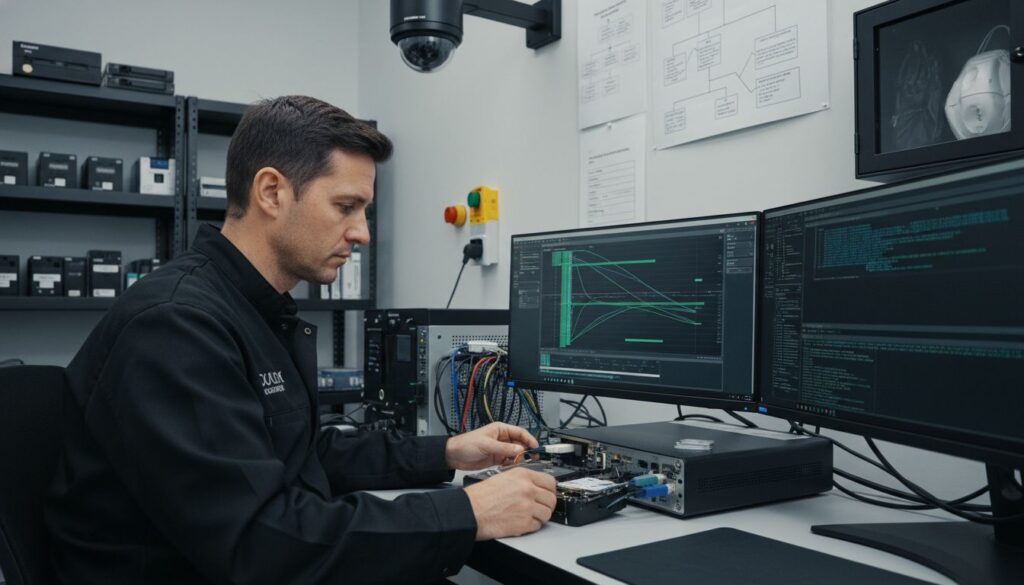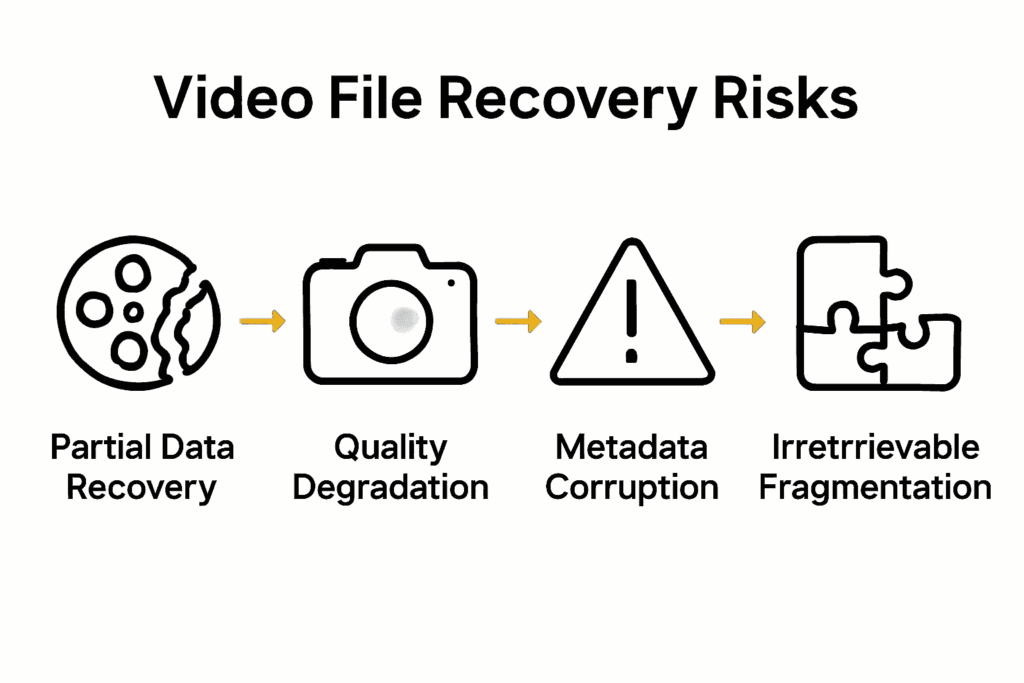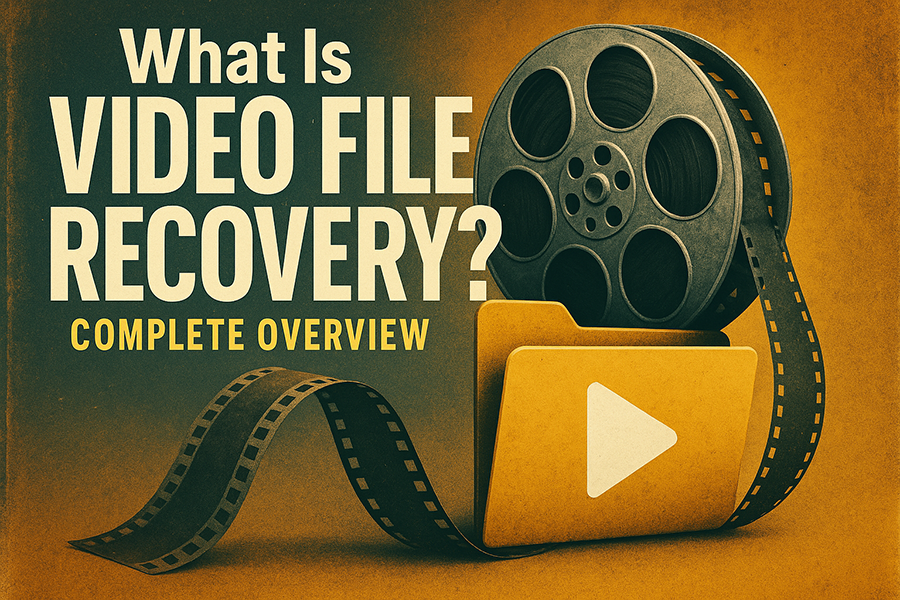Every year, millions of video files are lost or damaged, with over 60 percent of people reporting lost digital memories due to accidental deletion or storage failure. Losing precious videos can mean losing family moments, vital project footage, or critical research data. Understanding how video file recovery works is key to saving these valuable files and protecting them from permanent loss, whether for personal keepsakes or professional projects.

Table of Contents
- Defining Video File Recovery And Its Importance
- Types Of Video File Loss Scenarios
- How Professional Recovery Processes Work
- Risks And Limitations Of File Recovery
- Legal And Privacy Considerations In The UK
- Preventing Future Video Data Loss
Key Takeaways
| Point | Details |
|---|---|
| Importance of Video File Recovery | Video file recovery is essential for preserving critical data across fields like media, research, and law, necessitating specialized techniques for restoration. |
| Types of Video File Loss | Common causes of video file loss include accidental deletion, hardware failures, and malware, emphasizing the need for preventive measures like backups and security. |
| Professional Recovery Process | The recovery process involves creating forensically sound copies, analyzing file systems, and meticulously reconstructing video content to maintain quality. |
| Legal Considerations | Compliance with legal frameworks such as GDPR is crucial during the recovery process to maintain data integrity and ensure proper authorization is obtained. |
Defining Video File Recovery And Its Importance
Video file recovery is a specialised process of retrieving lost, deleted, corrupted, or inaccessible video files from various digital storage media. As the Digital Curation Centre highlights, digital video serves as vital research and personal data across numerous fields, making effective preservation and recovery strategies crucial.
Recovering video files is essential because these digital assets can contain irreplaceable memories, critical research data, professional recordings, or significant multimedia content. Unlike simple text documents, video files are complex data structures composed of intricate encoding, compression, and multimedia components. When a video file becomes inaccessible, specialised techniques are required to reconstruct and restore the original visual and audio information.
The importance of video file recovery extends across multiple domains:
- Professional media production
- Academic and scientific research
- Personal memory preservation
- Forensic and legal documentation
Our corrupt video recovery services understand the nuanced challenges of video file restoration. Whether you’ve accidentally deleted a critical project file or encountered storage media corruption, professional recovery techniques can often retrieve seemingly lost visual data with high precision and minimal quality degradation.
Types Of Video File Loss Scenarios
Video file loss can occur through multiple unexpected scenarios, as highlighted by the University of Edinburgh Library, encompassing both physical and digital threats to your valuable multimedia content.
The primary types of video file loss scenarios include:
Here’s a summary of common video file loss scenarios and their typical causes:
| Loss Scenario | Typical Causes | Preventive Measures |
|---|---|---|
| Accidental Deletion | Unintentional file removal | Enable file recovery bins Regular backups |
| Hardware Failures | Mechanical breakdowns Storage device faults | Use quality hardware Rotate storage |
| Software Corruption | System crashes Improper shutdown | Use stable software Apply timely updates |
| Virus & Malware Attacks | Infection from untrusted downloads or emails | Install antivirus Regular scans |
| Physical Damage | Water, fire, or extreme temperature exposure | Store in safe environments |
| Power Surge Incidents | Sudden electrical disruptions | Use surge protectors |
- Accidental Deletion: Unintentionally removing files from storage devices
- Hardware Failures: Physical damage or mechanical breakdowns in storage media
- Software Corruption: System crashes, improper shutdowns, or software malfunctions
- Virus and Malware Attacks: Malicious software that can encrypt or destroy video files
- Physical Damage: Environmental threats like water damage, fire, or extreme temperatures
- Power Surge Incidents: Electrical disruptions that can damage storage systems
Each scenario presents unique challenges for data recovery. Professional data recovery techniques must adapt to different damage mechanisms, whether dealing with mechanical hard drive failures, logical file system errors, or complex multimedia file structure corruption.
For those experiencing corrupt video recovery challenges, understanding these potential loss scenarios can help prevent future data loss and prepare more effectively for potential recovery efforts. Proactive measures like regular backups, using surge protectors, and maintaining robust cybersecurity can significantly reduce the risk of permanent video file loss.
How Professional Recovery Processes Work
Professional video file recovery is a meticulous forensic process designed to retrieve digital video content with maximum precision and data integrity. As outlined by the UK Government’s Forensic Science Guidelines, the core principle involves creating a bit-for-bit copy of the original video to preserve image quality and ensure the footage remains completely unaltered from its original state.

The recovery workflow typically involves several critical stages:
- Initial Assessment: Diagnosing the specific type and extent of video file damage
- Media Imaging: Creating a forensically sound duplicate of the original storage media
- File System Analysis: Examining the underlying digital structure
- Data Reconstruction: Methodically rebuilding fragmented or corrupted video files
- Verification: Confirming the recovered video’s integrity and completeness
Specialised techniques are employed depending on the storage medium and damage type, whether dealing with hard drives, memory cards, or optical media. Video evidence recovery protocols emphasise maintaining strict forensic standards to ensure that retrieved footage remains admissible and authentic, particularly in professional or legal contexts.
Professional recovery goes beyond simple file restoration. Technicians use advanced tools and techniques to navigate complex file systems, recover data from physically damaged storage devices, and reconstruct video files that might seem permanently lost to an untrained eye. The goal is not just retrieval, but returning the video content in its most complete and original form possible.
Risks And Limitations Of File Recovery
Video file recovery is not a guaranteed solution, and several critical risks can compromise the restoration process. As highlighted by the UK Government’s Forensic Science Guidelines, improper handling during recovery can lead to permanent data loss, particularly when digital video recorders are mismanaged.

Key limitations in video file recovery include:
- Partial Data Recovery: Incomplete restoration of original file contents
- Quality Degradation: Potential loss of original video resolution or clarity
- Metadata Corruption: Risk of losing critical file information
- Irretrievable Fragmentation: Permanent data loss for severely damaged files
Traditional recovery techniques face significant challenges with fragmented or overwritten files. Research from Manchester Metropolitan University demonstrates that standard file carving techniques may fail when video files are extensively damaged, making accurate reconstruction increasingly difficult.
For those experiencing complex data loss, deleted file recovery services can provide a professional assessment of potential recovery options. While not every video file can be fully restored, expert intervention significantly improves the chances of retrieving valuable multimedia content, offering a critical lifeline for seemingly lost digital memories.
Legal And Privacy Considerations In The UK
Video file recovery in the United Kingdom involves navigating a complex landscape of legal and privacy regulations. UK Government CCTV Guidelines provide comprehensive frameworks for capturing, recovering, and managing digital imaging and video-based evidence, ensuring that recovery processes comply with stringent statutory requirements.
Key legal considerations for video file recovery include:
- Data Protection Compliance: Adherence to GDPR and Data Protection Act 2018
- Consent Requirements: Ensuring proper authorization for data retrieval
- Evidence Authenticity: Maintaining forensic integrity of recovered files
- Confidentiality Protocols: Protecting sensitive personal and professional information
The Forensic Science Code of Practice emphasises maintaining the absolute integrity of digital evidence throughout the recovery process. This means any professional recovery must document every step, ensure chain of custody, and prevent any potential data manipulation.
For individuals and businesses concerned about the legal nuances of data recovery, data confidentiality services can provide expert guidance on navigating these complex regulatory landscapes, ensuring that video file recovery remains both legally compliant and ethically sound.
Preventing Future Video Data Loss
Preserving video data requires a proactive and strategic approach to digital asset management. University of Edinburgh Library recommends establishing a consistent backup schedule using multiple storage methods to safeguard valuable video content from potential loss.
Key strategies for preventing video data loss include:
- Multiple Backup Locations: Using external hard drives, cloud storage, and local backups
- Regular Backup Scheduling: Automated and manual backup routines
- Storage Media Rotation: Preventing single-point failures
- Virus and Integrity Checks: Monitoring file health and potential corruption risks
The National Archives emphasises the importance of implementing comprehensive digital preservation strategies. This involves conducting regular virus checks, performing fixity checks to verify file integrity, and maintaining multiple copies of critical video files across different storage platforms. For those seeking comprehensive guidance on protecting their digital assets, our ultimate guide to external hard drive data recovery provides in-depth insights into advanced data protection techniques, helping users develop robust strategies to prevent permanent video file loss.
Recover Your Precious Video Files with Expert Care and Precision
Video file loss can be devastating whether it is cherished personal memories or critical professional footage. Complex challenges like corruption, accidental deletion, or hardware failures require specialised recovery techniques to restore video quality and metadata without compromise. If you recognise these painful scenarios from the complete overview on video file recovery, you are not alone. At Data Recovery London, our experienced technicians have been recovering valuable data from damaged hard drives, memory cards, RAID systems, and video recording devices since 2003.
Don’t let your irreplaceable video files be lost forever. With our proven track record in handling intricate video restore cases under forensic standards, we offer you a professional and trustworthy solution that aims for the highest level of data integrity. Act now to safeguard your multimedia assets by visiting our main website to get an expert assessment. Early intervention increases the chances of successful recovery. Explore your options with our comprehensive corrupt video recovery services and secure the future of your digital memories today.
Frequently Asked Questions
What is video file recovery?
Video file recovery is the process of retrieving lost, deleted, corrupted, or inaccessible video files from various digital storage media, using specialized techniques to restore original visual and audio information.
Why is video file recovery important?
Video file recovery is crucial because video files can contain irreplaceable memories, critical research data, and professional recordings. Effective recovery strategies help preserve important multimedia content that may otherwise be permanently lost.
What are common scenarios that can lead to video file loss?
Common scenarios include accidental deletion, hardware failures, software corruption, virus attacks, physical damage, and power surge incidents. Each scenario presents unique challenges for data recovery.
How does the professional video file recovery process work?
The professional recovery process typically involves assessing the damage, creating a forensically sound duplicate of the storage media, analyzing the file system, reconstructing lost data, and verifying the recovered video’s integrity.
Recommended
- Corrupt Video Recovery | Professional Data Recovery Services In London
- Request a Quote | Data Recovery Lab
- Deleted File Recovery – Professional Data Recovery Services In London


